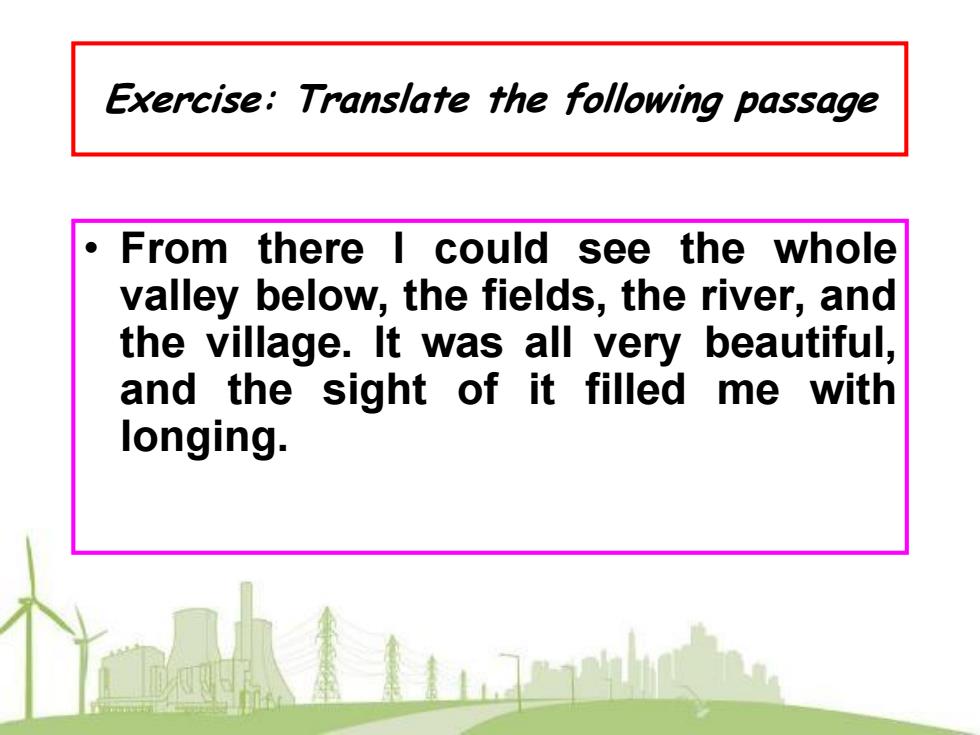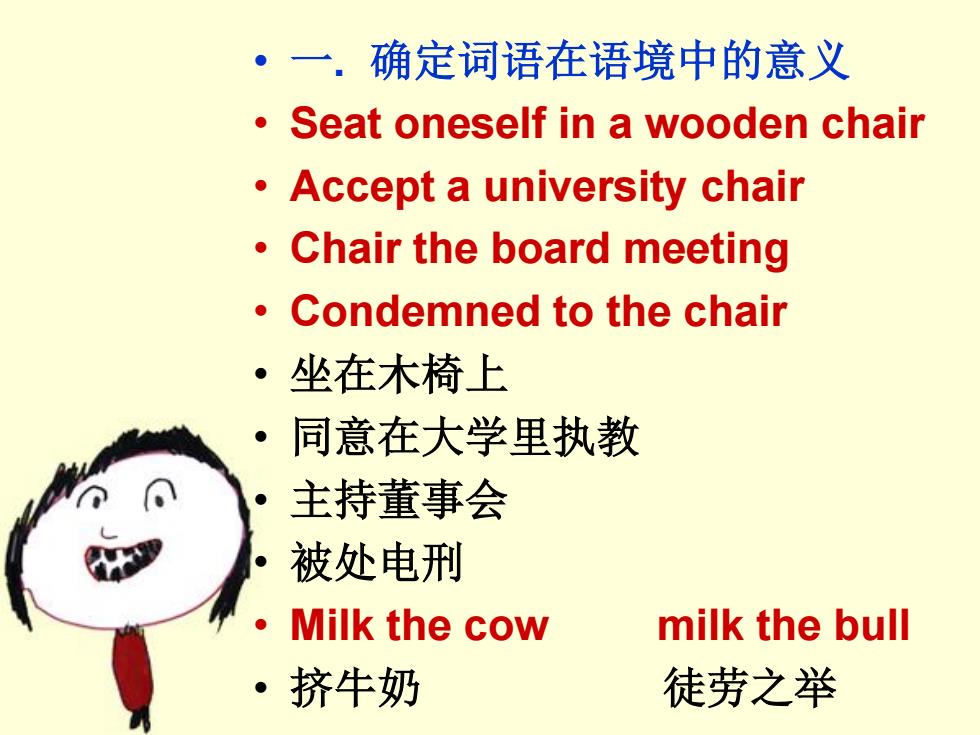
Exercise:Translate the following passage ● From there I could s see the whole valley below,the fields,the river,and the village.It was all very beautiful, and the sight of it filled me with longing
Exercise: Translate the following passage • From there I could see the whole valley below, the fields, the river, and the village. It was all very beautiful, and the sight of it filled me with longing

From there I could see the whole valley below,the fields,the river,and the village.It was all very beautiful,and the sight of it filled me with longing. 从那里,我可以看见下面的整个山谷 那田野、河流和村庄。这一切非常美丽, 见到后使我心里充满了渴望。 ·从这里望下去,整个山谷一览无遗,只 见那田野、河流和村庄,全都美不胜收, 真叫我心驰神往
From there I could see the whole valley below, the fields, the river, and the village. It was all very beautiful, and the sight of it filled me with longing. • 从那里,我可以看见下面的整个山谷, 那田野、河流和村庄。这一切非常美丽, 见到后使我心里充满了渴望。 • 从这里望下去,整个山谷一览无遗,只 见那田野、河流和村庄,全都美不胜收, 真叫我心驰神往

1.3翻译的过程 1.3.1准备阶段:弄清楚作者的风格、文字特点、同一作家的其 他作品、作家的身世以及其写作的社会背景等 13.2理解阶段:翻译的理解是以忠实地表达为目标的,因此, 它要求对原作的理解尽可能全面、细致和深入;“不求甚解”的 情况在翻译理解中是不允许的。 理解主要是通过原文的上下文来进行,因为: “No context,no text.” ● 上下文/语境(context)指词语、句子、段落等与其所处的整个篇 章或整部作品的其它部分的关系。上下文分析在翻译的理解阶段 具有十分重要的意义。 文章中大大小小的语言单位之间,处在特定的语义环境中,一般 都存在着相互关联、交织、修饰、限定的关系,即上下文关系 英国著名语言学家Randolph Quirk说过:“我们只有见到一个 词在上下文中实际运用了的时侯,才能谈这个词的意义
1.3 翻译的过程 1.3.1 准备阶段:弄清楚作者的风格、文字特点、同一作家的其 他作品、作家的身世以及其写作的社会背景等。 • 1.3.2 理解阶段:翻译的理解是以忠实地表达为目标的, 因此, 它要求对原作的理解尽可能全面、细致和深入;“不求甚解”的 情况在翻译理解中是不允许的。 • 理解主要是通过原文的上下文来进行,因为: • “No context, no text.‖ • 上下文/语境(context)指词语、句子、段落等与其所处的整个篇 章或整部作品的其它部分的关系。上下文分析在翻译的理解阶段 具有十分重要的意义。 • 文章中大大小小的语言单位之间,处在特定的语义环境中,一般 都存在着相互关联、交织、修饰、限定的关系,即上下文关系。 英国著名语言学家Randolph Quirk 说过:“我们只有见到一个 词在上下文中实际运用了的时侯,才能谈这个词的意义。

·一.确定词语在语境中的意义 Seat oneself in a wooden chair Accept a university chair Chair the board meeting Condemned to the chair ·坐在木椅上 同意在大学里执教 主持董事会 被处电刑 Milk the cow milk the bull 挤牛奶 徒劳之举
• 一. 确定词语在语境中的意义 • Seat oneself in a wooden chair • Accept a university chair • Chair the board meeting • Condemned to the chair • 坐在木椅上 • 同意在大学里执教 • 主持董事会 • 被处电刑 • Milk the cow milk the bull • 挤牛奶 徒劳之举

1.I never had much in seeing you. There was no love lost between us at any time. ·2.Ne grumble (抱怨)a little1 now and then to be sure.But there's no love lost between us. 1.我向来不大想看到你,我们两人之间 大概什么时候都不曾有过好感。 2当然啦,我们有时也免不了争论几句, 但是我们还是相亲相爱。 3.I am afraid photograph is not my cup of tea. http://artworkshop.com.hk
• 1. I never had much in seeing you. There was no love lost between us at any time. • 2. We grumble (抱怨) a little now and then , to be sure. But there’s no love lost between us. • 1.我向来不大想看到你,我们两人之间 大概什么时候都不曾有过好感。 • 2.当然啦,我们有时也免不了争论几句, 但是我们还是相亲相爱。 • 3. I am afraid photograph is not my cup of tea